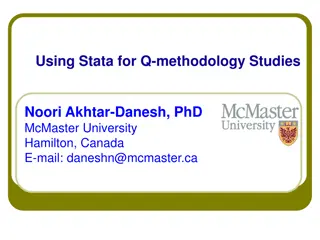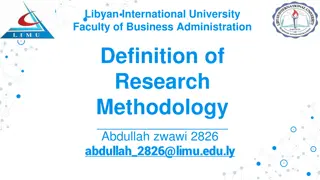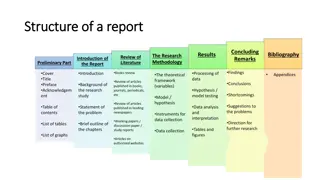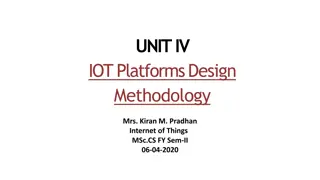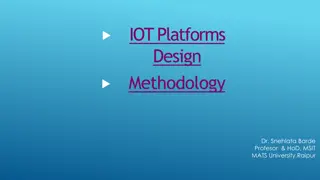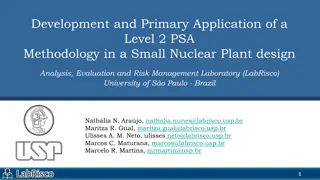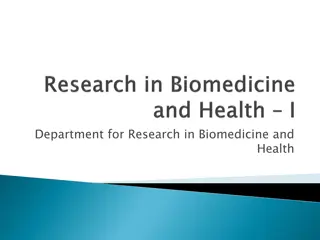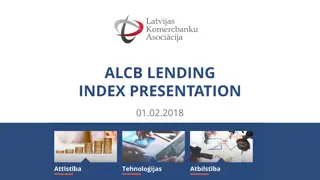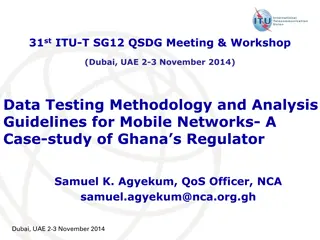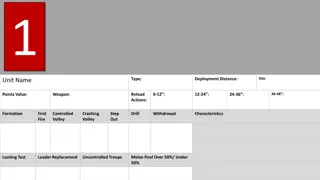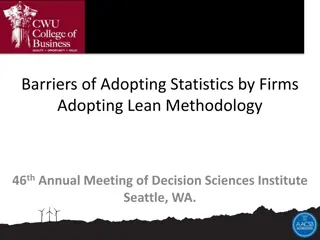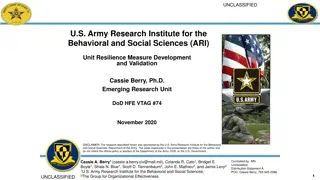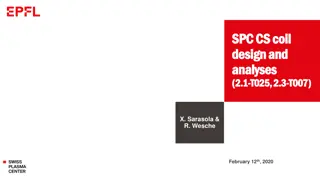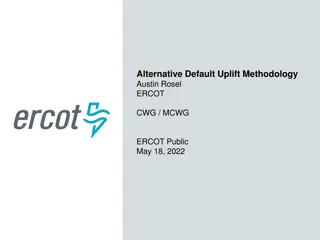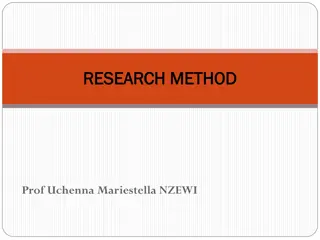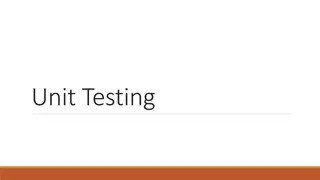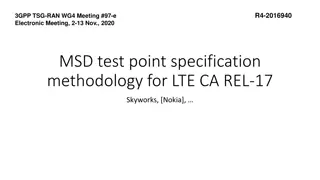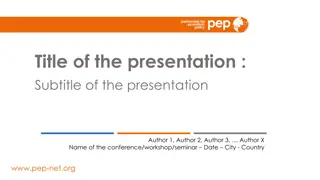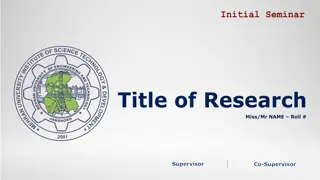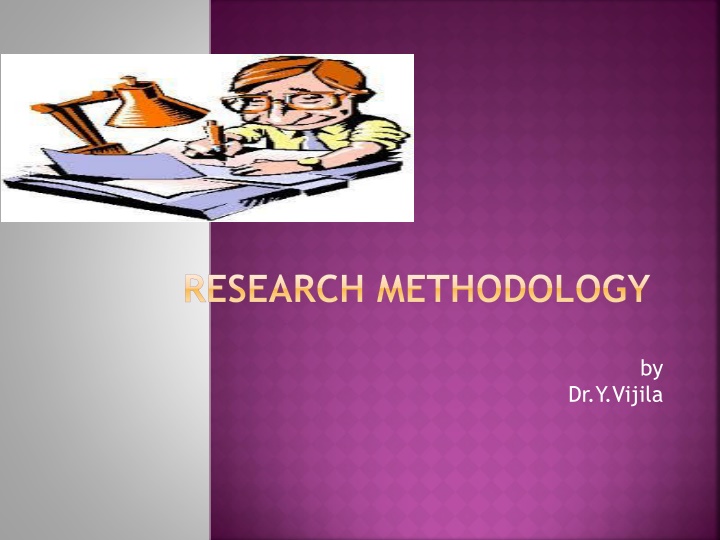
Research Methodology and Objectives for Knowledge Development
Delve into the world of research with Dr. Y. Vijila as we explore basic concepts, types, and the nature of research. Discover the objectives of research, its scope, and its significance in various fields such as production management, academic personnel management, marketing management, and finance. Uncover the essence of research as a continuous and dynamic systematic process that seeks new knowledge and solutions.
Download Presentation

Please find below an Image/Link to download the presentation.
The content on the website is provided AS IS for your information and personal use only. It may not be sold, licensed, or shared on other websites without obtaining consent from the author. If you encounter any issues during the download, it is possible that the publisher has removed the file from their server.
You are allowed to download the files provided on this website for personal or commercial use, subject to the condition that they are used lawfully. All files are the property of their respective owners.
The content on the website is provided AS IS for your information and personal use only. It may not be sold, licensed, or shared on other websites without obtaining consent from the author.
E N D
Presentation Transcript
RESEARCH METHODOLOGY by Dr.Y.Vijila
BASIC CONCEPTS AND TYPES OF RESEARCH Meaning of research The Research Question/Problem The Hypothesis Defining the Instrument Gathering Data Analyzing Data Drawing Conclusions Discussion
RESEARCH - MEANING search for facts. Research process. collection ,analysis and interpretation of data to answer a certain question or solve a problem. Research is a movement from the known to unknown. Example:Buying TV Research is the scholarly pursuit of new knowledge, discovery, or creative activity in an area with the goal of advancing that area's frontiers or boundaries." is Research a continuous is and dynamic systematic the
NATURE OF RESEARCH Development of knowledge Scientific study of social life Welfare of Humanity Classification of facts Transformative Experience Specialist Knowledge and Skills Empirical/Field based Analytical/ Conceptual problems Normative/Evaluative(value judgements) Social control and prediction
OBJECTIVES OF RESEARCH To gain familiarity with a phenomenon or to achieve new insights into it (exploratory or formulative research studies); 2. To portray accurately the characteristics of a particular individual, situation or a group (studies with this object in view are known as descriptive research studies); 3. To determine the frequency with which something occurs or with which it is associated with something else (studies with this object in view are known as diagnostic research studies); 4. To test a hypothesis of a causal relationship between variables (such studies are known as hypothesis-testing research studies).
SCOPE Research inculcates scientific and inductive thinking and it promotes the development of logical habits of thinking and organisation. Research provides the basis for nearly all government policies in our economic system. Research has its special solving various operational and planning problems of business and industry Research is equally important for social scientists in studying social relationships and in seeking answers to various social problems significance in
Production Management Academic Personnel Management Marketing Management Finance Management ,ect
RELEVANCE/NEEDS Provide guidance to social planning Facilitates control by providing knowledge Knowledge is enlightment Suggests effective remedial measures Affords sound basis for prediction
In addition to what has been stated above, the significance of research can also be understood keeping in view the following points: (a) To those students who are to write a master s or Ph.D. thesis, research may mean a careerism or a way to attain a high position in the social structure; (b) To professionals in research methodology, research may mean a source of livelihood;
(c) To philosophers and thinkers, research may mean the outlet for new ideas and insights; (d) To literary men and women, research may mean the development of new styles and creative work; (e) To analysts and intellectuals, research may mean the generalisations of new theories.
CRITERIA OF GOOD RESEARCH The purpose of the research should be clearly defined and common concepts be used. The research procedure used should be described in sufficient another researcher to repeat further advancement, keeping the continuity of what has already been attained. detail to permit the research for
The procedural design of the research should be carefully planned to yield results that are as objective as possible. The researcher should report with complete frankness, flaws in procedural design and estimate their effects upon the findings. The analysis of data should be sufficiently adequate to reveal its significance and the methods of analysis used should be appropriate. The validity and reliability of the data should be checked carefully.
The analysis of data should be sufficiently adequate to reveal its significance and the analysis used should be appropriate. The validity and reliability of the data should be checked carefully. Conclusions should be confined to those justified by the data of the research and limited to those for which the data provide an adequate basis. Greater confidence in research is warranted if the researcher is experienced, has a good in research and is a person of integrity. methods of reputation
THE QUALITIES OF A GOOD RESEARCH Good research is systematic: It means that research is structured with specified steps to be taken in a specified accordance with the well defined set of rules. Systematic characteristic research does not rule out creative thinking but it certainly does reject the use of guessing and intuition conclusions. sequence in of the in arriving at
Good research is logical: This implies that research is guided by the rules of logical reasoning and the logical process of induction and deduction are of great value in carrying out research. Induction is the process of reasoning from a part to the whole whereas deduction is the process of reasoning from some premise to a conclusion which follows from that very premise. In fact, logical reasoning makes meaningful in the context of decision making. research more
Good research is empirical: It implies that research is related basically to one or more aspects of a real situation and deals with concrete data that provides a basis for external validity to research results. Good research is replicable: This characteristic allows research results to be verified by replicating the study and thereby building a sound basis for decisions.
TYPES OF RESEARCH Pure- Basic/Methodologically correct Applied Basic Descriptive Explorative Predictive Qualitative Quantitative
PROBLEM FORMULATION INVOLVES moving to and from different levels of abstraction and generality (Punch 2000) a progressive sharpening of concepts and a progressive narrowing of scope (Selltiz 1976)
RESEARCH AREA RESEARCH TOPIC QUESTIONS (Most abstract & general) (Most concrete & specific) DATA GENERAL RESEARCH COLLECTION QUESTIONS QUESTIONS SPECIFIC RESEARCH
There must be an individual or a group which has some difficulty or the problem. (ii) There must be some objective(s) to be attained. (iv) There must remain some doubt in the mind of a researcher with regard to the selection of alternatives. (v) There must be some environment(s) to which the difficulty pertains.
NECESSITY OF DEFINING THE PROBLEM A proper definition of research problem will enable the researcher to be on the track whereas an ill-defined problem may create hurdles. Questions like: What data are to be collected? What characteristics of data are relevant and need to be studied? What relations are to be explored. What techniques are to be used for the purpose?
TECHNIQUE INVOLVED IN DEFINING A PROBLEM (i) statement of the problem in a general way; (ii)understanding the nature of the problem; (iii) surveying the available literature (iv) developing the ideas through discussions; (v) rephrasing the research problem into a working proposition.
Technical terms and words or phrases, with special meanings used in the statement of the problem, should be clearly defined. Basic assumptions or postulates (if any) relating to the research problem should be clearly stated. A straight forward statement of the value of the investigation (i.e., the criteria for the selection of the problem) should be provided. The suitability of the time-period and the sources of data available must also be considered by the researcher in defining the problem. The scope of the investigation or the limits within which the problem is to be studied must be mentioned explicitly in defining a research problem.
WHAT IS A LITERATURE REVIEW? A literature review is not an annotated bibliography in which you summarize briefly each article that you have reviewed. While a summary of the what you have read is contained within the literature review, it goes well beyond merely summarizing professional literature.
It focuses on a specific topic of interest to you and includes a critical analysis of the relationship among different works, and relating this research to your work. It may be written as a stand-alone paper or to provide a theoretical framework and rationale for a research study (such as a thesis or dissertation).
Un biased Comprehensive Critical review Best use of available knowledge Known to unknown How others done their study It gives steps to carryout your research Published,unpublished
Gap identification Why am i doing this study Different findings Underlying theory(gender and belief) Different perspectives of same study(what is sociological/psychological/management perspective?) Methodological review(What kind of measures they used, items they used, what type of statistics are they used) Historical review(when it started what are the changes occurred over the period)
Journal articles are current in information Books are best for theoretical understanding Internet, published or unpublished dissertations, govt records/reports
CONDUCTING A SYSTEMATIC REVIEW Identify and define the area / topic of research Decide on type of review/ period cover Design a search strategy/search engine List out key words for search Search on reference list and bibliography What to include while writing review Objective, method, finding,direction for future research
STEPS IN DOING LITERATURE REVIEW Step-1: read the abstract(find the relevance) Step-2: Read the full article(make a note of relevant information) Step-3:Select useful quotes that you may want to include in your review. Step4:Identify major trends or patterns: Identify gaps in the literature, and reflect on why these might exist (based on the understandings that you have gained by reading literature in this field of study). These gaps will be important for you to address as you plan and write your review.
Identify relationships among studies Keep your review focused on your topic: Analyse discuss and write conclusion on reviews
Citation Sample Environment Method Conclusions Summary table of literature Atmospherics in service environments Colour Bellizzi, Crowley and Hasty (1983) Laboratory experiment Photographic slide simulations Warm and cool colours created different emotional responses. Customers view red retail environments as more negative and unpleasant than blue. 125 Adults Furniture store Bellizzi, & Hite (1992) 70 Adult women 107 Students Televisions shown different colour backgrounds Furniture stores Laboratory experiments Photographic slide simulations Study based on PAD affect measures and approach- avoidance behaviours. More positive retail outcomes occurred in blue environments than red. with Music Smith and Curnow (1966) 1100 Supermarket shoppers Field experiment Time in store reduced with loud music but level of sales did not. Retail store Field experiment The tempo of background music influenced the pace at which customers shopped. Slow tempo music slowed customers down but resulted in increased volume of sales. Milliman (1982) 216 Shoppers Supermarket Hui, Dub and Chebat (1997) Bank branch - waiting for service. Laboratory experiment Video simulation The positive impact of music on approach behaviours is mediated by an emotional evaluation of the environment and the emotional response to waiting. Pleasurable music produced longer perceived waiting times. 116 Students Lighting Field experiment The investigation found that brighter in-store lighting influenced shoppers to examine and handle more of the merchandise in the store Areni and Kim (1994) 171 Shoppers Wine store Summers and Hebert (2001) Hardware store Apparel store Field experiment Confirmed Areni and Kims (1994) results. Increased levels of lighting will produce arousal and pleasure and increase the approach behaviours of customers. 2367 Customers 37
PILOT STUDY A pilot study, pilot project or pilot experiment is a small scale preliminary study conducted in order to evaluate feasibility, time, cost, adverse events, and effect size (statistical variability) in an attempt to predict an appropriate sample size and improve upon the study design prior to performance of a full-scale ...
PILOT STUDY A smaller version of a larger study that is conducted to prepare for that study. A pilot study can involve pretesting a research tool, like a new data collection method. It can also be used to test an idea or hypothesis. Pilot studies are used as feasibility studies, to ensure that the ideas or methods behind a research idea are sound, as well as to work out the kinks in a study protocol before launching a larger study.
PILOT STUDY A small study conducted in advance of a planned project, specifically to test aspects of the research design (such as stimulus material) and to allow necessary adjustment before final commitment to the design. Although not unknown in qualitative research, these are more common in large quantitative studies, since adjustment after the beginning of fieldwork is less possible than in qualitative work
VARIABLES Variables are names that are given to the variance we wish to explain. A variable is either a result of some force or is itself the force that causes a change in another variable. In experiments, these are called dependent and independent variables respectively.
TYPES OF VARIABLES Numerical Categorical Dependent and Independent Active Attribute Composite Confounding Qualitative Quantitative Continuous Universal
HYPOTHESIS Rummel and Balline defined hypothesis as a statement capable of being tested and thereby verified or rejected . Formulation of the specific problems is derivation of hypotheses from the problem. The problem is the question and the hypothesis is the answer.
GOOD HYPOTHESIS Is your hypothesis based on your research topic? Can your hypothesis be tested? Does your hypothesis include independent and dependent variables?
TYPES Declarative form- Positive form of stating Null Hypothesis- negative form of stating The question form- The relationship among variables is stated in a question form. Differential hypothesis Relational hypothesis Descriptive hypothesis Explanatory hypothesis
SOURCES OF HYPOTHESIS The general Culture Current popular beliefs and practices Asking more questions in the subject already studied Personal experience and individual reactions Analogies are often acted as a source of hypotheses. Findings of other studies through deductive reasoning.

